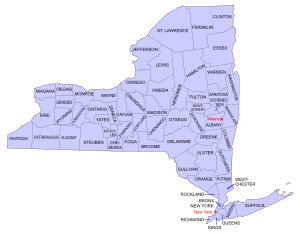List of counties in New York
| Counties of New York | |
|---|---|
 |
|
| Location | State of New York |
| Number | 62 |
| Populations | 4,836 (Hamilton) – 2,504,700 (Kings County) |
| Areas | 33.77 square miles (87.5 km2) (New York) – 2,821 square miles (7,310 km2) (St. Lawrence) |
| Government | County government |
| Subdivisions | Cities, Towns, Indian Reservations |
There are 62 counties in the state of New York. The original twelve counties were created immediately after the British takeover of the Dutch colony of New Amsterdam, although two of these counties have since been abolished. The most recent county formation in New York was in 1914, when Bronx County was created from the portions of New York City that had been annexed from Westchester County in the late 19th century and added to New York County. New York's counties are named for a variety of Native American words, British provinces, counties, cities, and royalty, early American statesmen and military personnel, and New York State politicians.
The FIPS county code is the five-digit Federal Information Processing Standard (FIPS) code which uniquely identifies counties and county equivalents in the United States. The three-digit number is unique to each individual county within a state, but to be unique within the entire United States, it must be prefixed by the state code. This means that, for example, while Albany County, is 001, Addison County, Vermont, and Alachua County, Florida, are also 001. To uniquely identify Albany County, New York, one must use the state code of 36 plus the county code of 001; therefore, the unique nationwide identifier for Albany County, New York, is 36001. The links in the column FIPS County Code are to the Census Bureau Info page for that county.
Five of New York's counties are each coextensive with New York City's five boroughs and do not have county governments. They are: New York County (Manhattan), Kings County (Brooklyn), Bronx County (The Bronx), Richmond County (Staten Island), and Queens County (Queens).
...
Wikipedia
